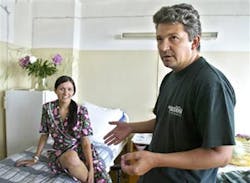Investigators Probe Russian Plane Disaster; Death Toll Rises to 125
Relatives and friends of passengers aboard an Airbus A310 that crashed at a Siberian airport went from one hospital to another Tuesday in hopes of finding survivors, while aviation officials struggled to explain Russia's second deadly passenger jet disaster in nearly as many months.
Three other incidents involving Russian-operated planes occurred on Monday, including the crash-landing in Ukraine of a jet carrying Russia's navy chief. Several officers on board suffered burns. The two other incidents involved successful emergency landings after technical failures - adding more questions about the safety record of the nation's civil aviation industry.
In Irkutsk, 4,200 kilometers (2,600 miles) east of Moscow, the Airbus airliner, operated by the company S7, careened off a wet runway and slammed into adjacent garages Sunday morning, bursting into flames.
As of Tuesday, 125 of the 203 people aboard were confirmed dead, after one died in a hospital, the Emergency Situations Ministry said. Fifty-two remained hospitalized.
The Russian prosecutors' office said 128 had died, including the hospital patient. Neither office could explain the discrepancy.
Twelve of the most critically injured were transported to Moscow on Tuesday for medical treatment, and more were expected to be sent in coming days, regional government officials said.
The preliminary investigation showed that the plane's braking system failed, Russian news agencies reported, citing unnamed sources. Transport Minister Igor Levitin said the two flight recorders were being analyzed.
There were 193 passengers on the Moscow-Irkutsk flight Sunday - including 14 children - and a crew of 10, the S7 press office said. At least 12 were foreigners, from Belarus, Poland, China, Germany and Azerbaijan, according to the flight manifest.
At one Irkutsk morgue, dozens of people struggled to identify their loved ones, clustering around printed lists of the victims, which bore graphic, clinical details of the victims. One woman shouted in frustration at the line of police controlling the entrance to the morgue: "Can we just go and see the children? Can't we just identify the children?"
Ivan Zotov said he lost his 32-year-old brother, who was returning from a vacation at the Black Sea resort of Sochi. His brother's wife and daughter had not learned of the death yet, since they were on a train home to Irkutsk.
"It's ridiculous. It's like they're just a sack of potatoes. How can we figure anything out from these lists?" Zotov said, shaking his head in frustration.
Levitin told reporters that authorities were looking into a proposal to lengthen the runway at the airport by 400 meters (a quarter-mile) and he announced financing for resurfacing the runway.
The plane, built in 1987, had been regularly maintained and met all certifications, airline spokesman Konstantin Koshman said.
The catastrophe was the second major commercial airline crash in two months in Russia. It was the fourth air crash in Irkutsk in the past 12 years.
In May, another Airbus crashed in stormy weather off Russia's Black Sea coast as it prepared to land, killing all 113 people on board. Airline officials blamed the crash of the Armenian passenger plane on driving rain and low visibility.
Airline experts said though Russia's safety record is not yet up to Western standards, it is far better than during the chaotic post-Soviet period, when the state carrier Aeroflot split into hundreds of private carriers, many of which lacked funds to properly maintain and service their planes.
"The safety record has improved a lot in recent years. In not all that long from now, it may be comparable with the West," said David Learmount, an aviation safety expert from the British weekly Flight International.
News stories provided by third parties are not edited by "Site Publication" staff. For suggestions and comments, please click the Contact link at the bottom of this page.

